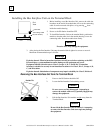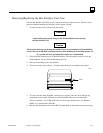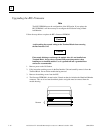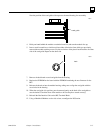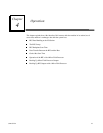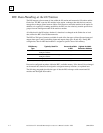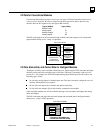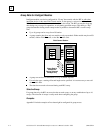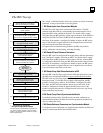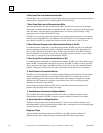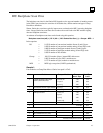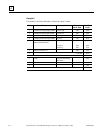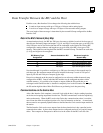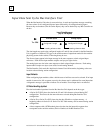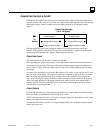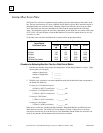
GFK-0825F Chapter 4 Operation 4-5
4
The BIU Sweep
The "sweep" of the Bus Interface Unit is the sequence of actions it executes
repeatedly as long as the module is receiving power.
1 BIU Reads Inputs from Conventional Modules
The BIU first reads inputs from conventional I/O modules. The BIU
combines input data with any corresponding forced data and puts it in its
input data tables at the configured locations. If a module fails to supply
valid input data, the BIU generates a fault report to the host. If the module is
configured for Hold Last State, the BIU holds the module's data at its last
valid state. If the module is configured to default its inputs, the BIU places
zeros in the module's assigned references for all inputs that are not forced.
Any forced inputs retain their forced states.
For inputs from conventional analog modules, the BIU also performs
scaling, calibration, alarm checking, and range checking.
2 BIU Reads All Input Reference Parameters
Next, the BIU reads all configured discrete and analog reference parameters
from "intelligent" modules (including an MFP). If a module fails to supply
valid input data, the BIU generates a fault report to the host. If the module
is configured for Hold Last State, the BIU holds the module's data at its last
valid state. If the module is configured to default its inputs, the BIU places
zeros in the module's assigned references for all inputs that are not forced.
Any forced inputs retain their forced states.
3 BIU Reads Group Data Whose Destination is BIU
Next, the BIU reads the input group data for which the destination is slot 0
(the BIU) from all intelligent modules except a Synchronization module.
The BIU reads only the group inputs that have been configured to be read
during that sweep. If a module fails to supply valid input data, the BIU
generates a fault report to the host. If the module is configured for Hold
Last State, the BIU holds the module's data at its last valid state. If the
module is configured to default its inputs, the BIU places zeros in the
module's assigned references for all inputs that are not forced. Any forced
inputs retain their forced states.
4 BIU Sends Group Data to Synchronization Module
If a module (usually a Micro Field Processor) has been configured as a
Synchronization module, the BIU next transfers group data assigned to be
sent to it during that sweep.
5 BIU Sends Reference Parameters to a Synchronization Module
If a module has been configured as a Synchronization module, the BIU next
sends its reference parameter data from BIU tables.
Read all inputs from conventional
destination is the BIU, except groups
Read all reference parameter inputs from
•smart" modules
Read all group data moves whose
whose source is a Synchronization module
Send Group Data moves
to a Synchronization module
Send outputs from BIU tables
to Synchronization modules
Move all inputs within BIU network map
from BIU tables to the Genius
communications buffers
Move all outputs within BIU network
map from the Genius communications
buffers to the BIU internal tables
Read all reference input parameters from
a Synchronization module
Read all group data to the BIU
from a Synchronization module
Send all outputs to conventional modules
Send all reference parameter outputs to
•smart" modules, but not to
a Synchronization module
Send all group data to all •smart"
modules except Synchronization module
Background Tasks
.
1
2
3
4
5
6
7
8
9
10
11
12
discrete and analog input modules
.
.
*
*
*
*
* Group Data is moved only
during its configured BIU sweeps.
BIU Waits if
MFP is busy
The tasks shown in shaded boxes are performed
only if the I/O Station includes a Synchronization
module. The Synchronization module is usually a
Micro FIeld Processor.
46543



